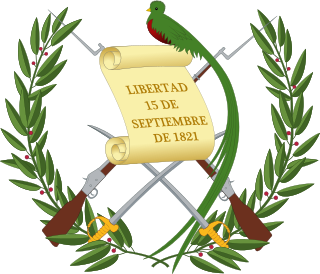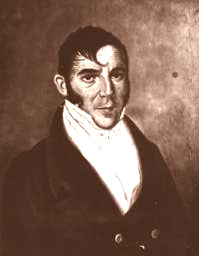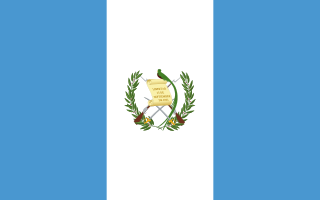
Politics of Guatemala takes place in a framework of a presidential representative democratic republic, where by the President of Guatemala is both head of state, head of government, and of a multi-party system. Executive power is exercised by the government. Legislative power is vested in both the government and the Congress of the Republic. The judiciary is independent of the executive and the legislature. Guatemala is a Constitutional Republic.
Telecommunications in Guatemala include radio, television, fixed and mobile telephones, and the Internet.

The Communications Act of 1934 is a United States federal law signed by President Franklin D. Roosevelt on June 19, 1934 and codified as Chapter 5 of Title 47 of the United States Code, 47 U.S.C. § 151 et seq. The Act replaced the Federal Radio Commission with the Federal Communications Commission (FCC). It also transferred regulation of interstate telephone services from the Interstate Commerce Commission to the FCC.

Ramiro de León Carpio was the President of Guatemala from 6 June 1993 until 14 January 1996.

Álvaro Enrique Arzú Yrigoyen was a Guatemalan politician who was the 32nd President of Guatemala from 14 January 1996 until 14 January 2000. He was elected Mayor of Guatemala City on six occasions: in 1982, when he declined taking office because of a coup d'état; in 1986; in 2003, after serving as president; in 2007; in 2011, and in 2015, for a term that would see him die in office.

Manuel José Arce y Fagoaga was a decorated General and president of the Federal Republic of Central America from 1825 to 1829, followed by Francisco Morazán.

The Congress of the Republic is the unicameral legislature of the Republic of Guatemala. The Guatemalan Congress is made up of 160 deputies who are elected by direct universal suffrage to serve four-year terms. The electoral system is closed party list proportional representation. 31 of the deputies are elected on a nationwide list, whilst the remaining 127 deputies are elected in 22 multi-member constituencies. Each of Guatemalas's 22 departments serves as a district, with the exception of the department of Guatemala containing the capital, which on account of its size is divided into two (distrito central and distrito Guatemala). Departments are allocated seats based on their population size and they are shown in the table below.

Claro Company is a Mexican company part of América Móvil, a Mexican telecom group. Claro serves clients in Argentina, Brazil, Chile, Colombia, Costa Rica, the Dominican Republic, Ecuador, El Salvador, Germany, Guatemala, Honduras, Nicaragua, Panama, Paraguay, Peru, Puerto Rico and Uruguay. The company's name means "bright," "clear," and also "of course," in both Portuguese and Spanish.

The Guatemalan Civil War was a civil war in Guatemala fought from 1960 to 1996 between the government of Guatemala and various leftist rebel groups. The government forces have been condemned for committing genocide against the Maya population of Guatemala during the civil war and for widespread human rights violations against civilians. The context of the struggle was based on longstanding issues of unfair land distribution; European-descended residents and foreign companies, such as the American United Fruit Company, had dominated control over much of the land, leading to conflicts with the rural poor.

The Universidad de San Carlos de Guatemala is the largest and oldest university of Guatemala; it is also the fourth founded in the Americas. Established in the Kingdom of Guatemala during the Spanish colony, it was the only university in Guatemala until 1954, although it continues to hold distinction as the only public university in the entire country.

José Felipe Mariano Gálvez was a jurist and Liberal politician in Guatemala. For two consecutive terms from August 28, 1831, to March 3, 1838, he was chief of state of the State of Guatemala, within the Federal Republic of Central America. In 1836, he was elected a member of the American Philosophical Society.
In Guatemala, regular phone numbers are 8 digits. The first digit indicates the type of phone:
2: Guatemala City
3: Mobile
4: Mobile
5: Mobile
6: Guatemala Department
7: Rural Guatemala / Rest of country

Guatemala, officially the Republic of Guatemala, is a country in Central America, bordered by Mexico to the north and west, Belize and the Caribbean to the northeast, Honduras to the east, El Salvador to the southeast and the Pacific Ocean to the south. With an estimated population of around 17.2 million, it is the most populous country in Central America and is the 11th most populous country in the Americas. Guatemala is a representative democracy; its capital and largest city is Nueva Guatemala de la Asunción, also known as Guatemala City, the largest city in Central America.

Lesbian, gay, bisexual, and transgender (LGBT) persons in Guatemala may face legal challenges not experienced by non-LGBT residents. Both male and female same-sex sexual activity are legal in Guatemala.

This is an Index of Central America-related articles. This index defines Central America as the seven nations of Belize, Costa Rica, El Salvador, Guatemala, Honduras, Nicaragua, and Panama.

The Postal Union of the Americas, Spain and Portugal is a regional association of the postal authorities in Latin America, the Caribbean, the United States, Canada, Spain, and Portugal, headquartered in Montevideo. It was founded in 1911 as a restricted union of the Universal Postal Union.
Byron Barrera Ortiz is a Guatemalan journalist noted for his reporting of human rights abuses by the Guatemalan government during and after the Guatemalan Civil War, for which he received repeated threats against his life. In 1990, his wife, Refugio Araceli Villanueva de Barrera, was murdered in an attack on their car. Members of the Guatemalan military have been implicated in the crime.
Fritz García Gallont is a Guatemalan politician. He is a member of the Unionist Party. He served as Minister of Communications under President Álvaro Arzú. He served as Mayor of Guatemala City from 2000 to 2004. In 2003, his bid for the presidency was unsuccessful.
Ricardo Bueso is a Guatemalan businessman and politician.
Mario López Estrada is Guatemala's first billionaire and a telecommunications businessman. He studied Engineering at Guatemala's San Carlos University.













